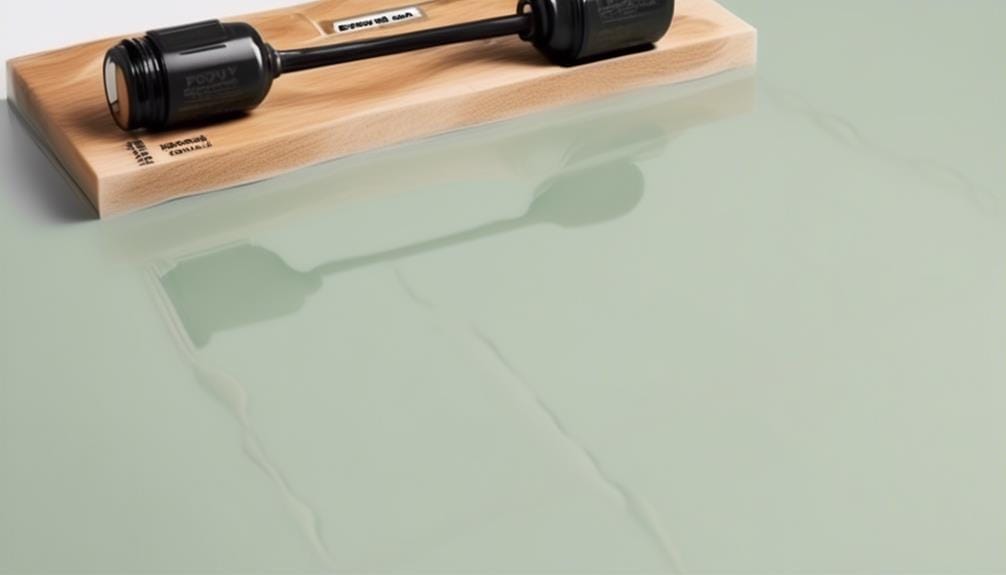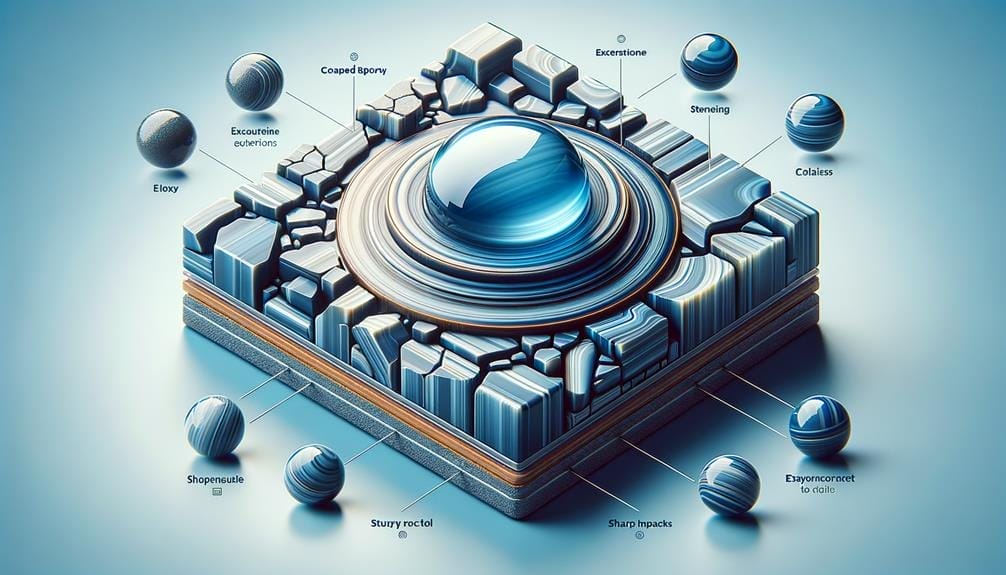You may be skeptical about the Strength and durability of epoxy resin, considering its low tensile Strength and vulnerability to extreme conditions.
However, it’s important to understand that epoxy’s exceptional Strength lies in its molecular structure and interlocking bonds, especially when applied on a well-prepared concrete base.
In this discussion, we will explore the factors that affect epoxy strength, its durability in different environments, and how it compares to other materials.
We will also delve into the various applications of epoxy resin and provide tips on maximizing its Strength for different uses.
So, let’s dive into the fascinating world of epoxy and discover its true potential.
Key Takeaways
- Epoxy’s Strength is determined by factors such as compressive, tensile, flexural, and bond strength.
- The material composition and proper selection of materials play a crucial role in enhancing epoxy strength.
- Surface preparation techniques, such as acid etching, are important for maximizing bond strength.
- Epoxy exhibits high compressive Strength, surpassing concrete and wood, making it suitable for applications with heavy loads.
Factors Affecting Epoxy Strength
To understand the factors that affect epoxy strength, it’s important to consider the various testing methods and material composition involved.
Epoxy strength is determined by compressive, tensile, flexural, and bond strength. The Strength of the epoxy resin blend, hardener, and substrate also plays a crucial role in determining its overall Strength and durability.
Testing methods, such as ASTM C881, serve as a master test standard for epoxy strength. These methods provide a standardized approach to evaluating the strength properties of epoxy materials. By following these testing procedures, manufacturers and users can accurately assess the Strength and durability of the epoxy resin.
Material composition is another key factor affecting epoxy strength. The resin blend, hardener, and substrate all contribute to the overall Strength and bonding capabilities of the epoxy. The proper selection and combination of these materials are essential to ensure optimal strength and durability.
In particular, tensile strength is of utmost importance as materials typically fail under tension. Therefore, understanding and improving the tensile Strength of epoxy is crucial for enhancing its overall Strength and durability.
Additionally, proper surface preparation is vital to maximizing the bond strength between the epoxy and the foundation. Techniques like acid etching can create a rough surface, allowing for better adhesion and stronger bonds.
Understanding Epoxy Durability
Understanding the durability of epoxy involves considering its long-lasting Strength, adhesion, and performance in various industries and applications. Here are three key factors to understand epoxy durability:
- Exceptional Strength: Epoxy resins are specifically designed to possess high compressive, tensile, and flexural strengths. These properties are crucial for ensuring the durability of epoxy in different applications. Epoxy products undergo rigorous testing according to the ASTM C881 standard, guaranteeing their Strength and reliability.
- Superior Adhesion: Epoxy resin forms strong interlocking bonds with various substrates, enhancing its durability. This adhesive property allows epoxy to bond tightly to surfaces, preventing delamination, cracking, or peeling. Whether it’s used in construction, automotive, or aerospace industries, epoxy’s excellent adhesion ensures its long-lasting performance.
- Versatile Applications: Epoxy’s durability makes it suitable for a wide range of industries and applications. From flooring systems that withstand heavy foot traffic and chemical exposure to structural repairs that require exceptional Strength, epoxy is known for its durability and resilience. Its ability to withstand harsh environments, temperature fluctuations, and corrosive substances makes it a reliable choice in various settings.
Understanding the durability of epoxy resin is crucial for selecting the right product for specific applications. Its exceptional Strength, superior adhesion, and versatile applications make it a durable choice in industries where longevity and reliability are paramount.
Comparing Epoxy to Other Materials

When comparing epoxy to other materials, its exceptional Strength and durability set it apart as a preferred choice in various industries and applications. Epoxy resin exhibits high compressive, tensile, and flexural Strength, making it an extremely strong and durable material. In fact, its compressive Strength can reach up to 10,000 psi, surpassing the Strength of quality concrete. Epoxy also boasts superior tensile Strength, making it ideal for structural applications where materials may fail in tension.
To further illustrate the Strength and durability of epoxy, let’s compare it to other common materials:
| Material | Compressive Strength (psi) | Tensile Strength (psi) |
|---|---|---|
| Epoxy | Up to 10,000 | High |
| Concrete | Around 3,000 | Moderate |
| Wood | 300-1,000 | Low |
| Steel | 50,000-100,000 | Very high |
As we can see from the table, epoxy surpasses both concrete and wood in terms of compressive Strength. Moreover, when compared to steel, epoxy may not have the same tensile Strength, but it is still a durable material that offers excellent adhesion, coating capabilities, and overall longevity.
Compressive Strength of Epoxy
Now, let’s discuss the compressive Strength of epoxy.
Testing epoxy strength involves applying pressure on both sides of an epoxy cylinder. Non-flexible epoxies start at slightly under 10,000 psi.
The compressive Strength of epoxy resin allows it to withstand pressures of over 10,000 PSI. This makes it suitable for various applications in industrial and commercial flooring.
Testing Epoxy Strength
To accurately assess the Strength of epoxy, it’s essential to conduct compressive strength testing, which involves applying pressure to both sides of an epoxy cylinder to measure its weight-bearing capacity. This testing method provides valuable insights into the epoxy’s ability to handle weight and withstand compression.
Here are three key points about testing epoxy strength:
- Non-flexible epoxies typically have a compressive strength starting at slightly under 10,000 psi, which exceeds the quality of concrete. This demonstrates the durability and Strength of epoxy resin.
- Tensile strength is crucial as materials often fail under tension. Epoxy.com epoxy has significantly higher tensile strength than concrete, further highlighting its durability and reliability.
- Epoxy.com products are designed with a high safety margin compared to concrete in terms of compressive Strength. This ensures that epoxy can withstand substantial weight and pressure, making it an ideal choice for various applications.
Factors Affecting Durability
Factors affecting the durability of epoxy, specifically its compressive Strength, can greatly impact its performance and longevity in various applications.
Compressive Strength refers to the ability of epoxy to withstand significant levels of stress when it’s being compressed. Epoxy achieves its compressive Strength through the formation of interlocking bonds between its molecules, making it an extremely strong and durable material.
This Strength allows epoxy to be used in a variety of applications where it’s subjected to heavy loads or pressure. For example, in construction, epoxy is commonly used as a structural adhesive to bond concrete or metal components together. Its high compressive Strength ensures that the bonded materials remain securely in place, even under intense pressure.
Understanding the factors that affect epoxy’s compressive Strength is crucial in selecting the right epoxy for specific applications, ensuring optimal performance and durability.
Tensile Strength of Epoxy

The tensile Strength of epoxy resin, which measures its ability to resist forces pulling it apart, is significantly higher than that of concrete. This makes epoxy resin a preferred choice for applications where Strength and durability are essential.
Here are three key points to consider regarding the tensile Strength of epoxy:
- Superior Strength: Epoxy.com epoxy exhibits a much higher tensile strength than concrete. Its interlocking bonds create a robust network that can withstand substantial pulling forces. In fact, Epoxy.com Product #10 Epoxy Mortar boasts a tensile strength that’s ten times stronger than concrete. This exceptional Strength ensures that epoxy resin can endure significant tension without failure.
- Importance of Tensile Strength: Materials often fail under tension, making tensile Strength a critical factor to consider. Epoxy resin’s high tensile Strength ensures that it can withstand stretching or pulling forces without breaking or losing structural integrity. This attribute is particularly important in applications where the material is subjected to constant or intermittent pulling forces.
- Durable Performance: Epoxy.com products are designed with a high safety margin compared to concrete, ensuring long-lasting and reliable performance. The superior tensile Strength of epoxy resin translates into enhanced durability, making it suitable for various demanding applications, such as industrial flooring, structural repairs, and adhesive bonding.
Flexural Strength of Epoxy
One important aspect to consider when evaluating epoxy resin is its flexural Strength, which measures its ability to resist being pulled apart when subjected to a bending force. Flexural Strength is crucial for materials that undergo bending or flexing, such as in structural applications. Epoxy with high flexural Strength is suitable for applications where it needs to withstand significant levels of bending loads without breaking.
The science behind epoxy’s high flexural Strength lies in its chemical composition. Epoxy resin is incredibly strong due to the interlocking bonds formed during the curing process. When epoxy hardens, the molecules form crosslinks, creating a three-dimensional network. This network structure enhances the material’s resistance to bending forces and prevents it from being pulled apart.
ASTM testing methods are used to determine the flexural strength of epoxy. These methods ensure standardized and reliable measurements, allowing engineers and manufacturers to select the appropriate epoxy resin for specific engineering and construction needs. Understanding the flexural Strength of epoxy is essential for designing structures that can withstand bending and flexing without failure.
Bond Strength of Epoxy

The bond strength of the epoxy is measured to assess the effectiveness of epoxy resin in bonding to various substrates. Bond strength refers to the ability of the epoxy to form a strong and durable bond with the substrate.
Epoxy resins are commonly used for their excellent bonding properties, as they can create interlocking bonds with a wide variety of materials.
Here are three key points about the bond strength of epoxy:
- Designed for optimal bonding: Epoxy.com resins are specifically formulated to provide excellent bond strength. In fact, the bond strength of epoxy resins on concrete can even exceed the tensile Strength of the concrete itself. This ensures a strong and long-lasting bond between the epoxy and the substrate.
- ASTM testing methods: The bond strength of epoxy is determined through standardized testing methods developed by the American Society for Testing and Materials (ASTM). These tests evaluate the adhesive properties of the epoxy and provide a reliable measure of its bond strength.
- Importance of tensile Strength: When considering bond strength, it’s important to focus on the epoxy’s tensile Strength. Tensile Strength refers to the maximum tension or pulling force that the epoxy can withstand before breaking. Since materials typically fail in tension, high tensile strength is crucial for ensuring the durability of the bond.
Applications of Epoxy Resin
Epoxy resin finds extensive application across various industries for its superior adhesion and durability, making it a highly sought-after choice for adhesives, paints, coatings, fillers, and sealants. Its ability to form strong interlocking bonds with various substrates makes it extremely durable in a wide range of applications.
Here are some examples of how epoxy resin is used in different industries:
| Industry | Application |
|---|---|
| Industrial painting | Epoxy resin is applied to substrates like steel and concrete, providing chemical and solvent resistance in industrial painting and sealing applications. |
| Plumbing | Plumbers use epoxy resin for leak-proof sealants in both residential and commercial plumbing applications. Its strong and durable connections ensure long-lasting results. |
| Painting and coating | Painters use epoxy resin to coat and seal surfaces, providing protection and enhancing durability, especially on metal surfaces. It is commonly used in both residential and industrial painting projects. |
| Aerospace and Electrical | Epoxy resin is utilized for reinforcement, sealing, and insulation in aerospace and electrical applications. It ensures durability in harsh environments and provides electrical insulation and conductivity. |
Maximizing Epoxy Strength for Various Uses

Maximizing the Strength of epoxy resin for its various applications requires careful consideration of its compressive, tensile, and flexural properties. Epoxy resin is known for its exceptional Strength and durability, making it a popular choice in a wide range of industries and crafts. To ensure that epoxy resin performs optimally, it’s important to understand and leverage its key properties.
- Compressive Strength: This property measures the weight-handling ability of epoxy resin. By understanding the compressive Strength, you can determine the maximum load the epoxy can withstand without deforming or breaking. This is crucial for applications that involve heavy loads or pressure.
- Tensile Strength: Materials often fail in tension, making tensile Strength a critical consideration. Epoxy.com products are designed with high bond strength on concrete, exceeding the tensile strength of the concrete itself. This ensures that the epoxy resin forms strong interlocking bonds, enhancing its overall Strength and durability.
- Flexural Strength: This property evaluates the resistance of a material to being pulled apart. It’s especially important when comparing materials for applications that involve bending or flexing. Epoxy resin’s superior adhesion and durability make it suitable for various uses where flexural Strength is essential.
Frequently Asked Questions
What Is the Strength of Epoxy?
The Strength of epoxy depends on various factors, including bonding techniques, additives, and testing methods. Epoxy exhibits exceptional compressive, tensile, and flexural Strength, making it a reliable choice for applications requiring resistance to weight, tension, and pulling forces.
Does Epoxy Lose Strength Over Time?
Over time, epoxy may experience a decrease in Strength due to factors like aging, degradation, and improper maintenance. Understanding these factors and implementing regular upkeep can help preserve the long-term durability of epoxy.
Does Epoxy Break Easily?
Epoxy’s high tensile strength and strong adhesion make it less prone to breaking than other adhesives. Factors like impact resistance, flexibility, and surface bonding contribute to epoxy’s durability.
How Long Will Epoxy Last?
Epoxy resin can last for a long time, depending on various factors. Proper installation and maintenance are crucial for maximizing its lifespan. It’s important to consider the type of environment and follow recommended maintenance practices to prolong the epoxy’s durability.
Conclusion
In conclusion, epoxy resin demonstrates impressive Strength and durability, making it a versatile material for various applications. Its molecular structure and interlocking bonds contribute to its robustness, particularly when installed on a well-prepared concrete base.
However, it’s crucial to note that cured epoxy has a low tensile strength and can be susceptible to breakage under significant pressure. Regular maintenance and care are essential to maximize its strength.
Overall, epoxy resin offers a reliable solution for many industries, but understanding its limitations is crucial for ensuring long-term durability.





